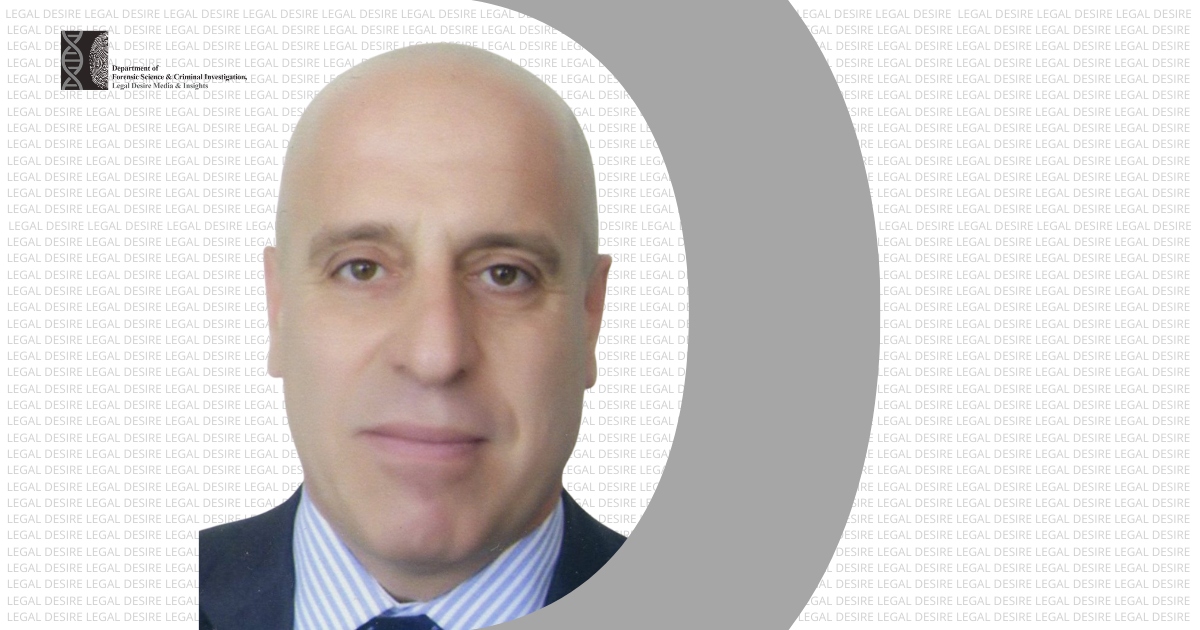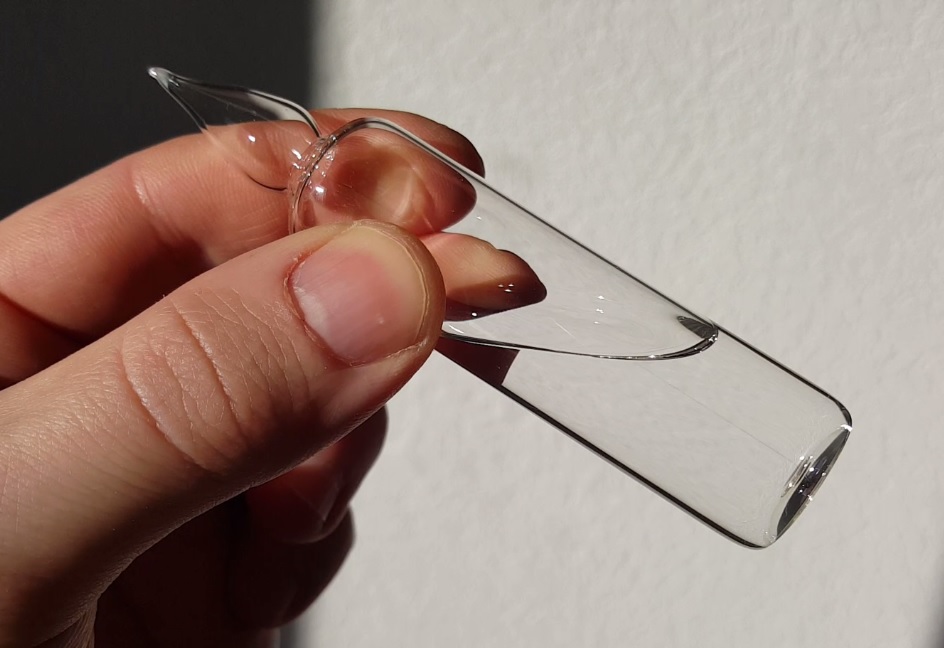Now Reading: In Conversation with Saleh Mansour, Retd. Captain, ISF, Lebanon.
-
01
In Conversation with Saleh Mansour, Retd. Captain, ISF, Lebanon.

In Conversation with Saleh Mansour, Retd. Captain, ISF, Lebanon.
Mr. Saleh Mansour was employed by law enforcement agency for thirty-three years. During those years he dedicated himself for serving the fair administration of justice, by transferring scientific knowledge and experience in the Fields of Forensic Sciences, Human Identification Technology, Fingerprints and Facial Recognition, Document Security and countering Fraudulent use of Identity Documents. Accordingly, in his lectures, training sessions, and other different events, he has been focusing on fighting the myths about forensic evidence namely fingerprint evidence, and deeply discussing the challenging issues related to the age of fingermarks, and their proper interpretation, aiming to highlight some scientific facts about fingerprints and performing a new approach and reconceptualization of the fingerprints as a tool for crime scene investigation and training.
Further, he is involved in scientific researches and building capabilities that related to the document security, and safety features used in Documents of value like the Banknotes, Travel and Identity Documents, aiming at supporting law enforcement and border control officers by the proper capabilities for fighting cross border crimes, terrorism, and misuse of Identity and travel documents and different kinds of banknotes.
Saleh is a life-long learner and shares his knowledge, experiences, and values through active participation in international symposiums, workshops, and conferences and through the courses he teaches.
- Serving as a Police Officer in various agencies of the Lebanese government, what inspired you to include Forensics to the Policing domain?
The main objective of the law enforcement officers is to preserve security, maintain order, and to support the public service, the judiciary and the whole criminal justice system by the means of good performance and professional governance. However, the police officers have a big role in the criminal investigations, that suggested being comprehensive, relevant, and very accurate, to provide the judiciary by the appropriate evidence that proves facts and reality. Otherwise, criminal investigations will turn over and contradict with justice and lead to the miscarriage of justice, that is the crucial challenge facing the criminal justice system, how to support the fair administration of justice?
Thus, after several years of service as an investigative officer and policing capabilities builder, I moved to the forensic domain starting by human identification through fingerprints and facial recognition in the Central Identification Bureau (CIB) within the Scientific Police Division (SPD).
- You have been serving as the Captain-Deputy Chief of Central Identification Bureau [CIB] & Internal Security Forces [ISF] of Lebanon. How are these roles different from normal policing?
Yes, for sure, there are a lot of differences between the normal policing roles and those related to a forensic police officer, that are different in many aspects.
The main duties of the normal police officer are to maintain peace, arrest suspects and criminals, investigate crimes and terrorism, confiscate, and so on. While in my previous capacity as a deputy head of a specialized unit (CIB), where I have been heavily involved and in charge of establishing and developing the total quality management system and processes. Also, I have participated in advancing and implementing a strategic plan that aimed at restructuring and re-engineering the entire workflows and procedures; a plan that tackled to upgrade the technical capacity, process maturity, and absorptive capability, upgrading the Automated Fingerprint Identification System (AFIS) to the newest Multi-Biometric system MBIS.
- In what areas related to Forensics and investigation, have you been contributing in the capacity building process for the policing domain? What challenges were encountered in this process?
Yes, since the early beginning of my service in 1988, I started by police capabilities building at the Police Academy and sports trainer. My duty is training of police officers from different grades in the following capabilities: Legal frame of self-defence and security operations, ethics and rules of conduct, Security operations, guard missions, patrols, techniques of intervention and arrestation, writing professional reports, and high standards of physical fitness. This service followed by a higher-level service as a commander at the Police of Beirut Operation’s Unit. My main missions were supervising the security patrol police operations in Beirut. Further, I have participated in numerous security operations in high-risk situations, like searching for and arresting dangerous suspects and criminals.
Moreover, as a certified trainer and pedagogic engineering specialist, I have delivered training sessions since 2004 by incorporating an integrated approach to meet the cross-cutting needs of the trainees and the service duties. It is a fascinating and challenging experience that suggests deep learning on how to use training techniques designed for adults, like interactive lectures instead of ordinary lectures, working in sub-groups, playing roles, practicing simulations, lab work, debriefings and feedback, effective evaluation techniques for examining the acquired competences and knowledge.
To add, I have been playing a pivotal role in re-inventing and reorganization the police officer’s training program related to the technical investigation and crime scene management, that impacted positively in the performance of these officers in criminal investigations at all levels and across Lebanon.
Furthermore, I have designed many training portfolios in the fields of document security, fingerprints, evidence collection, the chain of custody implementation, and crime scene first responders. Simulations, working in sub-groups, and case study were the main methods for effective training and building capabilities. These training sessions were done for police officers from different agencies in Lebanon, and many of these projects were funded and supervised by the EU delegation in Lebanon, and I have been delivering these trainings since 2010, that leads in upgrading the capabilities of police officers from different ranks and that have a great impact in their successful missions.
Besides, I have been involved in delivering training sessions in document security for many agencies in Lebanon aiming at improving border management control and countering the fraudulent use of identity documents, an initiative that is collaborating the efforts of national and international organizations and experts, amongst the INTERPOL for building police capabilities and international databases in sites, that allows to establish and maintain good contact and confidence between the concerned parties.
- Being a certified Trainer in various areas like Crime Scene Management, Document Security, and Training of the Trainers & undergone highly specialized trainings like forensic investigation of crime scene investigation, forensic examinations of terrorist crime scene, document security, humanitarian forensics under various national & international agencies, how useful are all these in policing & investigation?
It is not optional for the police officer to be well trained, capable, and multi-tasker to tackle the wide range of sensitive and crucial missions, that need a professional and prompt response. The scenario of misconduct of police officers at the crime scene will lead to destruction of the physical evidence or to add exterior and not related traces, so the police officer has to have sufficient knowledge about crime scene management, first responding, and forensics to acquire sufficient capability to investigate and fight crime and terrorism. Also, having a good experience in document security making the police officer capable to verify and ascertain the misuse of travel and identity documents, that is an essential condition to fighting identity theft and fraudulent use of identity documents, that are frequently used by the terrorists and major criminals.
Equally important, the coercive measures taken during various police operations have to respect human rights and the international humanitarian law, as the laws are put for the interest of the people, and therefore, the application of laws has to cope with the legal interest of the local communities. To emphasize, respecting human rights and applying the concepts of community policing by the law enforcement agencies play a fundamental role in fighting crimes and terrorism.
As a matter of fact, working in a close cooperation with different national and international law enforcement agencies and entities like the INTERPOL and EU organizations and projects, has an essential impact in enhancing and improving policing capabilities and responding approach at the various and different levels of police intervention.
- Working with the INTERPOL is a dream for many law enforcement personnel. You have worked closely with the INTERPOL on some occasions. How different is that experience from regular policing?
The INTERPOL has an essential role at the international policing level, and I totally agree that working with the INTERPOL is a dream for many law enforcement personnel. I was nominated several times by the DG of the Internal Security Forces (ISF) to participate in specialized symposiums about Fingerprints and Facial Recognition. Further, I have coordinated the INTERPOL International Training about Document Security that was held in Beirut 2018, and later on I have participated in the INTERPOL Specialized Border Management Training Session in 2019. Further, I have been nominated to be a local trainer during the hybrid INTERPOL training that was held in Beirut in November 2020 about “Strengthening Border Security Through Security Document Examination and Effective Use of INTERPOL Tools and Services”.
It is very fruitful experience that leads to profit from the high level of INTERPOL policing capabilities, and having a worldwide web of law enforcement communications.
- In your opinion, how important is it for a police officer to have a scientific temper for effective policing?
The traditional ways of policing and investigations that depends on coercive measures to get confessions are ineffective and contradict with the laws of the country and the human rights. Therefore, professional policing and investigations nowadays heavily depend on scientific approaches and specialized hearing techniques. Hence, the scientific temper is a prerequisite condition to recruit the police officers in the effective and modern policing.
- What is the process of crime scene investigation [from scene to lab] followed in Lebanon?
It is similar to the global crime scene management principles, starting from securing the scene, materializing traces and physical evidences, documenting by photos, maps, and descriptive reports, and finally processing by retrieving the traces, and sending them to the concerned units at the Scientific Police Division, with respect to the chain of custody exigences.
- On many instances, you were involved in Criminal Intelligence Analysis, Data Analysis, International Vehicle theft investigation, restructuring Police Officers training programs, drafting MOUs, SOPs, Quality Manuals, Writing Professional Reports for Scientific Police Division. How challenging was it to train the in-service & new recruits in the scientific police division?
Dedication and persistence are the main keys of success, it is not a matter of what you gain for your own profit but of what you achieved for global public interest. Consequently, focusing of great objectives require to have a very competent, skilled, qualified, capable, and well-trained assistants. That means to give a great concern to the training and building capabilities, as well as creative a supportive and cooperative work environment. On the other hand, there is a continuous need to enhance the capabilities of the investigators of the law enforcement agencies about the document security and countering fraudulent use of identity and travel documents, the scientific technical investigation, crime scene management and first responding.
- How different is Disaster Victim Identification on a scene & Terrorist Crime Scene from that of a normal crime scene? What precautions are to be considered while dealing with the evidences in these situations?
The main similarity between the three types of scenes is searching for the identification of the concerned people.
For the DVI, there is a need to identify victims by referring the scientific evidences like fingerprints and DNA, as well as by the Anti mortem and Post Mortem analysis (AM/PM) and a cooperative work between all the concerned agencies, hence the main focus is to identify the victims.
In the normal crime scene, the main focus is to identify the perpetrators, and to gather the physical evidences that help in the crime scene reconstruction, and to have as much as information about the role of the concerned persons.
Whereas in the terrorist crime scene, there is a need to identify the perpetrators and the victims at the same time, in addition to the terrorist groups and organizations, the facilitators, the funding sources, etc….that need a global cooperation between the concerned national and international agencies and entities.
Also, the approach of dealing with the TCS differs from that used in the NCR, as the motive is political (not personal) and to create a situation of terror and fear by using violent means of attack like arms, weapons, and explosives. Another difference is the type of evidences that are usually dangerous, very sensitive, and need special ways for documenting, lifting, transferring, and processing. For example, residues of explosive and other dangerous materials, that might need a great number of crime scene technicians to sift the dirt and collect the micro traces. Therefore, in terrorist crime scene there is a need for an investigation director, multi-specialized investigators and technicians, digital evidence experts, criminal intelligence analysts, and so on. That is totally different than the investigative approach used in the normal crime scenes.
- The police professionals are called at various scene of crime for investigation regularly. How did you manage to indulge into research work in spite of administrative work? What challenges did you encounter while doing so?
Working in the real-time cases and training usually illuminate on ambiguous areas of knowledge, where the current references and researches do not perform a concise and accurate answers, for example: How long is the finger-mark persist on different kind of surfaces? Is it possible to determine the age of the finger-mark? Is it possible to study the ink intersection from handwriting? that makes me curious to perform scientific researches in the concerned domains in collaboration with international experts and scientists. The main challenges are lack of time and funding, that need a good time management, a wide range of communications with international researchers, excellent use of interpersonal communication skills, and good use of existing resources.
- Having been into service for almost 3 decades in the Policing Domain, you might have received appreciation letters, awards and recognition for your outstanding contribution from various agencies and the government. What are some of them?
I only did my duty as it must be done. However, I have been conferred by many of the National Cedar Decoration – Cavalier grade, the Merit Decoration, The Merit Medal, and many written and verbal appreciations from the DG of the ISF, and from the Netherlands Marechaussee.
- Do you still wish to explore and contribute to the field of policing, forensics & capacity building? How?
Yes, by being involved in the scientific research related the forensic sciences like fingerprints and ink analysis, by being a freelance consultant in the concerned field of expertise, and by organizing specialized training sessions, and any support related to the human rights and public interest.
——————————————————————————————————————–
The interview was first published in Forensic Reporter February Issue 2021.
Interviewed by Bhargav Rathod, Executive Assistant, Legal Desire Media & Insights.










